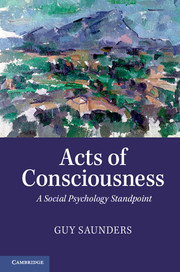Part II - To have consciousness
Published online by Cambridge University Press: 05 July 2014
Summary
INTRODUCTION
In Part II, we will ask: ‘How is it for you?’ We will unravel what is meant by the phrase ‘subjective conscious experience’ and address why subjectivity is important to us as persons. I will set out a Cubist Psychology standpoint on human experience. Experience is always ‘shared human experience’ that is only private when we do not reveal how it is for us. Any explanation of consciousness that leaves out the way things feel to us must fail to fairly address the subject. It is only by asking about ‘how it is’ to be a person that we can examine assumptions we may have made about our lives. Conventionally, there is a sense that we are completely separate from others, that we have our own personal private life and an essential self that lies at the very core of our being. I think we need to pull apart the familiar and everyday to get some idea of ‘what it is like’ to be us. As in Part I I will offer a social psychology standpoint, plus an added ‘psychology and the arts’ treatment in Chapter 5; both of these are written for you to try out as if they were yours or as a resistance against which to test out your standpoint.
Part ii differs from Part i in the way that consciousness is tackled. In Part i, we took the verb ‘to be’ as the main focus: in Part ii, we will take the verb ‘to have’. One of the commonsensical and commonplace ideas we have is the idea that we all ‘have experience’. We do something with someone else, such as go to see a film, and then ask them afterwards: ‘How was it for you?’ Why? Because we don’t have their point of view and the only way to find out anything about it is to ask them. Their report will help, but it won’t stand in for ‘how it was’ for them. We know that the report isn’t the experience itself from the standpoint of the person having it – it’s another one of their productions – but it may be all we have available to us. When the phrase ‘how it is’ (or Nagel’s ‘what it is like’1) or the word ‘experience’ is used in this part of the book, it stands in for the longer expression ‘subjective conscious experience’ and refers to how it is for us to live through and witness this life of ours.
- Type
- Chapter
- Information
- Acts of ConsciousnessA Social Psychology Standpoint, pp. 121 - 138Publisher: Cambridge University PressPrint publication year: 2014



